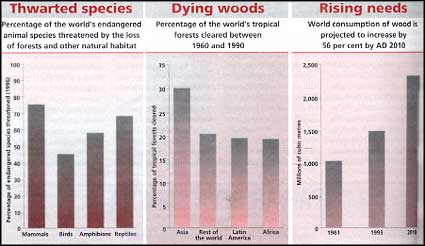Falling frontiers
 Forests help maintain the environmental conditions that make life possible, from regional hydrologic cycles to global climate. Frontier forests, large, ecologically intact and relatively undisturbed natural forests, are particularly important as they store tremendous amounts of carbon. Without these forests, this carbon would go straight into the atmosphere as carbon dioxide, a powerful greenhouse gas. Protecting and responsibly managing our last frontiers will help countries avoid paying the high costs associated with massive forest loss and degradation. Histor@ abounds with examples of civilisations that floundered after deforestation led to soil erosion, river siltation, wood shortages and other bapes of agricultural and industrial productivity.
Forests help maintain the environmental conditions that make life possible, from regional hydrologic cycles to global climate. Frontier forests, large, ecologically intact and relatively undisturbed natural forests, are particularly important as they store tremendous amounts of carbon. Without these forests, this carbon would go straight into the atmosphere as carbon dioxide, a powerful greenhouse gas. Protecting and responsibly managing our last frontiers will help countries avoid paying the high costs associated with massive forest loss and degradation. Histor@ abounds with examples of civilisations that floundered after deforestation led to soil erosion, river siltation, wood shortages and other bapes of agricultural and industrial productivity.
Related Content
- Modelling the economy-wide impact of technological innovation and mapping agricultural potential: the case of Burkina Faso
- World energy perspectives on e-mobility: closing the emissions gap
- Economically and environmentally informed policy for road resurfacing: tradeoffs between costs and greenhouse gas emissions
- Forget warming, Alaska facing ice age
- Rajasthan state action plan on climate change
- Bridge to troubled waters?
